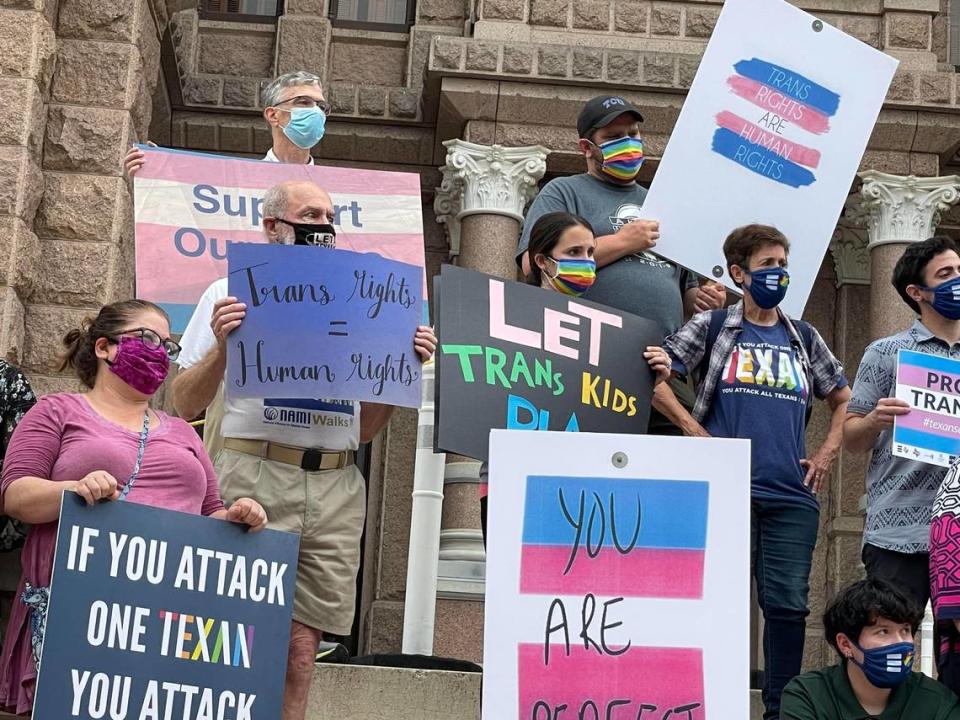Texas lawmakers threaten LGBTQ youth with ‘don’t say gay’ bills. And for no good reason | Opinion
As the Texas Legislature ramps up its 2023 work, two replicas of Florida’s “Don’t Say Gay” law sit pending before the House. These bills seek to prohibit basic, common-sense curricula related to sexual orientation and gender identity in Texas schools.
As an openly gay graduate of Arlington ISD and the University of Texas at Austin — and as someone who has suffered the consequences of anti-LGBTQ sentiment in our public schools — I see these bills as harmful and state Republican leaders’ push for them as misleading.
Here’s the reality: For many queer and trans young people, the bills entertained by our state legislators could mean the difference between life and death.
During the 2021 legislative session, the Trevor Project, the world’s largest suicide prevention and crisis intervention resource for LGBTQ youth, reported a 150% increase in crisis calls from youth in Texas — a result that can be directly tied to the record number of anti-LGBTQ bills introduced in 2021. As it is, LGBTQ youth are already more than four times as likely to attempt suicide.

This year’s session is poised to be even more brutal for queer and trans youth. As if censorship in our Texas public schools could get even more extreme, the two pending bills authored by Rep. Steve Toth, R-The Woodlands, and Rep. Jared Patterson, R-Frisco, go further than Florida’s “Don’t Say Gay” law, which prohibits education about sexual orientation and gender identity through third grade. The Texas measures would expanding these restrictions until fifth or eighth grade.
These bills are addressing an issue that does not exist. The effort serves to bolster the ongoing campaign by our political leaders to target LGBTQ Texans. The state GOP platform approved last year labels homosexuality “an abnormal lifestyle choice” and “opposes all efforts to validate transgender identity.” Lawmakers have already introduced 10 bills this year to restrict or criminalize access to life-saving gender-affirming healthcare for trans youth.
This campaign has had a tangible impact on queer and trans Texans. In 2022, Texas saw an increase in anti-LGBTQ protests and campaign messaging. In North Texas, the LGBTQ community suffered from an increase in hate crimes. As recently as 2019, Texas led the nation in the number of murders of trans people — a terrifying trend that disproportionately affects Black trans women.
Experts agree that continued targeting of queer and trans people risks further galvanizing violent extremists by normalizing the expression of hateful content.
But who is most at risk for feeling this harm? If the bills progress through the Legislature, it is important to understand what communities are most affected by anti-LGBTQ measures aimed at our public schools.
Across the United States, transgender students and LGBTQ students of color are more likely than their cisgender and/or white peers to face homophobia and transphobia at school. In Texas, trans young people are fleeing the state or facing questions from school administrators or even state investigation.
Trans students are also most affected by local school districts’ policies such as one recently implemented in Grapevine-Colleyville that seeks to invalidate trans identities.
Given that 1 in 5 high school students now identify as LGBTQ, you probably know at least one young person who has been affected by these harmful efforts to restrict our identities. There is no defense for causing harm to an already vulnerable population over a made-up issue.
If legislators want to work on creating a more productive and safe school culture, we need more curricula and resources for LGBTQ students in school. Research shows that the presence of LGBTQ-inclusive curricula is beneficial for students of all identities, not just queer and trans students. When students learn about LGBTQ identities in school curricula, they experience reduced levels of bullying, higher levels of safety, and lower rates of absenteeism.
State leaders should drop the harmful, flashy distractions. Let’s focus on actual, real-life problems, such as fixing the electric grid and funding higher education instead of trying to create a national profile or fundraise for the next primary campaign. LGBTQ students like myself would be grateful for a mature approach.
Isaac James is a graduate of Arlington High School and the University of Texas at Austin. In the fall, he will study the intersection of politics and education policy at the University of Oxford as a Rhodes Scholar.


